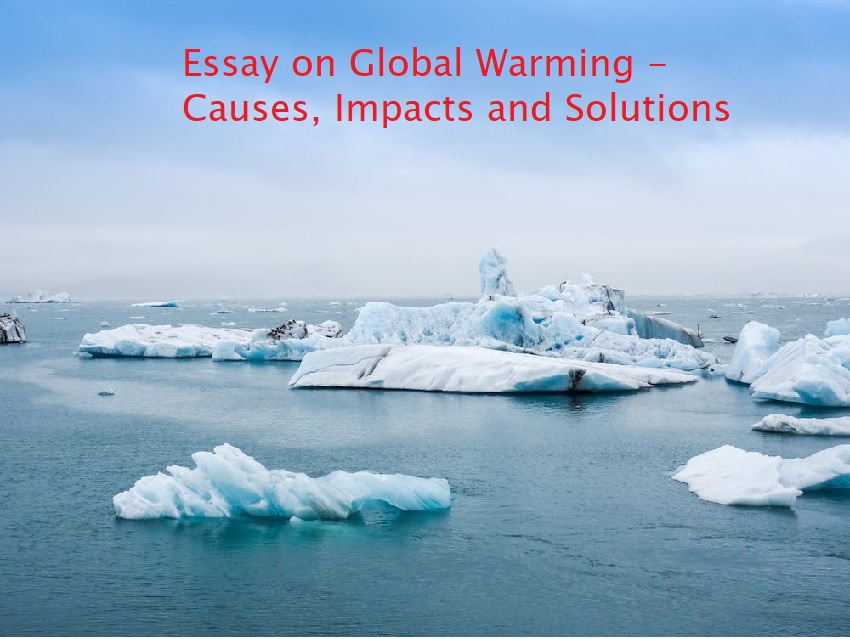Introduction: Global warming, a significant environmental issue, refers to the long-term increase in Earth’s average surface temperature due to human activities, primarily the emission of greenhouse gases. This essay explores the causes of global warming, its impacts on the planet and human life, and potential solutions to mitigate its effects and create a sustainable future.
Causes of Global Warming: The primary cause of global warming is the excessive release of greenhouse gases, including carbon dioxide (CO2), methane (CH4), and nitrous oxide (N2O). These emissions primarily result from the burning of fossil fuels for energy production, deforestation, industrial activities, and transportation. The accumulation of greenhouse gases in the atmosphere traps heat, leading to the greenhouse effect and a rise in global temperatures.
Impacts of Global Warming: Global warming has wide-ranging impacts on the environment and human societies. Rising temperatures contribute to the melting of polar ice caps, leading to a rise in sea levels and threatening coastal regions. Changing weather patterns and increased frequency of extreme weather events, such as hurricanes, droughts, and heatwaves, disrupt ecosystems and pose risks to agriculture, water resources, and human health.
Global warming also affects biodiversity, with species facing habitat loss, altered migration patterns, and increased extinction risks. The delicate balance of ecosystems is disrupted, impacting ecosystems’ functionality and the services they provide, such as pollination and water purification.
Solutions to Global Warming: Addressing global warming requires collective action and the adoption of sustainable practices. Some key solutions include:
- Transition to Renewable Energy: Shifting from fossil fuels to renewable energy sources such as solar, wind, and hydroelectric power reduces greenhouse gas emissions and promotes a cleaner energy future.
- Energy Efficiency: Emphasizing energy-efficient practices and technologies helps reduce energy consumption and lowers greenhouse gas emissions in residential, commercial, and industrial sectors.
- Reforestation and Forest Conservation: Protecting existing forests and undertaking reforestation initiatives help absorb CO2 and mitigate climate change.
- Sustainable Agriculture: Promoting sustainable farming practices, such as organic farming, agroforestry, and precision agriculture, reduces emissions from the agriculture sector and preserves soil health.
- Public Awareness and Education: Raising awareness about the impacts of global warming and encouraging sustainable lifestyle choices can drive individual and collective action.
Conclusion: Global warming poses a significant threat to our planet and future generations. By reducing greenhouse gas emissions, adopting sustainable practices, and fostering global cooperation, we can mitigate the impacts of global warming and create a sustainable and resilient future for all.
Global Warming Essay in 300 Words
Introduction: Global warming, resulting from the increase in greenhouse gases in the Earth’s atmosphere, is a pressing environmental issue. This essay discusses the causes of global warming, its impacts on the planet, and potential solutions to address this critical problem.
Causes of Global Warming: The primary cause of global warming is the excessive emission of greenhouse gases, primarily from human activities. Burning fossil fuels, deforestation, industrial processes, and agricultural practices release carbon dioxide (CO2), methane (CH4), and other greenhouse gases into the atmosphere. These gases trap heat and contribute to the greenhouse effect, leading to a rise in global temperatures.
Impacts of Global Warming: Global warming has far-reaching consequences. Rising temperatures cause the melting of ice caps and glaciers, leading to rising sea levels and increased coastal flooding. Changing weather patterns result in more frequent and intense heatwaves, droughts, storms, and other extreme weather events. Ecosystems and biodiversity suffer as habitats are disrupted and species face extinction risks. Furthermore, global warming exacerbates water scarcity, threatens food security, and poses health risks to human populations.
Solutions to Global Warming: To combat global warming, we must adopt sustainable practices and reduce greenhouse gas emissions. Transitioning to renewable energy sources, such as solar and wind power, is crucial. Energy efficiency measures, including improved building insulation and efficient transportation systems, can reduce energy consumption. Forest conservation and reforestation initiatives help absorb CO2. Sustainable agriculture practices minimize emissions from farming. Public awareness, education, and international cooperation play vital roles in driving collective action and policy changes to address global warming.
Conclusion: Global warming is a pressing challenge with severe environmental and societal impacts. By addressing the causes of global warming through sustainable practices, embracing renewable energy, and fostering global cooperation, we can mitigate the effects and work towards a sustainable and resilient future for our planet.
Essay on Global Warming in 150 Words
Global warming is an urgent environmental issue that poses significant challenges to our planet. It is primarily caused by the release of greenhouse gases into the atmosphere due to human activities. The burning of fossil fuels for energy production, deforestation, and industrial processes contribute to the accumulation of carbon dioxide and other greenhouse gases, leading to the greenhouse effect.
The impacts of global warming are far-reaching. Rising temperatures result in the melting of ice caps, leading to rising sea levels and increased coastal flooding. Extreme weather events such as heatwaves, droughts, and storms become more frequent and severe. Ecosystems and biodiversity face disruption, and vulnerable species face extinction risks. Moreover, global warming affects agriculture, water resources, and human health.
To mitigate global warming, we must take immediate action. This includes transitioning to renewable energy sources, improving energy efficiency, preserving forests, promoting sustainable agriculture, and raising public awareness about the importance of reducing greenhouse gas emissions.
Addressing global warming requires collective effort and global cooperation. By adopting sustainable practices and making conscious choices, we can make a positive impact and strive toward a more sustainable future for generations to come.

